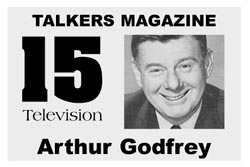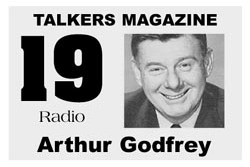
SITE NAVIGATION:
About Talkers Magazine
Latest Issue Front Page
Subscription Information
Talk Radio Research Project
Heavy Hundred 2001
News Notes
Online Classifieds
Week in Review
Gallery
Directory
of Talk Radio 2002 Edition


He had a storied career in both radio and television as a talk host but
he’s considered an innovator on several levels which changed the
way many broadcasters would produce talk shows ever after.
Arthur Godfrey ran away from home at 14 and joined the Navy at 17 where
he received technical radio training. From 1929 on, he worked on all four
major radio networks, sometimes simultaneously. After working as a staff
announcer on NBC for four years and unhappy with his salary, he free-lanced
his radio services in 1934 and did an early morning show on the CBS network
for decades.
Historians attribute his success to his informal, folksy, conversational
style during a period when other hosts worked from carefully written scripts.
He also pioneered the concept of making fun of the ads he would read and
often the products themselves.
To much fanfare, he began two television programs on CBS in 1948: “Arthur
Godfrey’s Talent Scouts” and “Arthur Godfrey and His
Friends.” While both were technically variety shows, a large portion
of their content was talk. His witty banter and down-to-earth interviews
are considered the cornerstones of his achievement both on radio and television.
Though he continued with some success on television into the early 1960s
and on radio into the early 1970s, it was his on-air dismissal of singer
Julius LaRosa in 1953 that many saw as the beginning of his downfall.
It exposed a side of him viewers weren’t aware of and many never
forgave him.
All Rights Reserved
Site Developed by TALKERS Magazine Online Webstaff
650 Belmont Ave
Springfield, MA 01108
(413) 746-6786 Fax